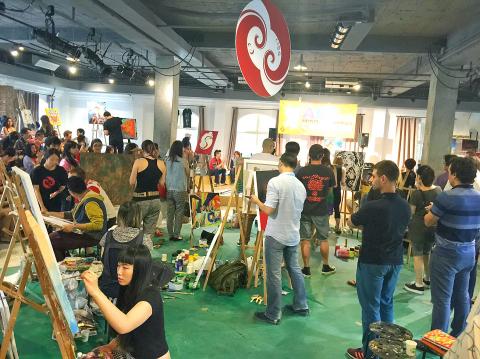Life is tough enough being a marginalized refugee in a new country — but when you are a lesbian, gay, bisexual or transgender refugee from a culture that does not approve of your orientation, you face a whole new level of fear and isolation.
Even before the Islamic State showed up and started killing suspected homosexuals, it had long been illegal to be gay in Syria — punishable by three years in jail.
“This is a situation that very few people are talking about,” Roma Mehta of the Red Room says. “But every time you mention it to somebody they are like, ‘It makes complete sense. Of course they would be even more marginalized.’”

photo courtesy of red room
The Red Room, which aims to provide a platform to bring together Taiwan’s creative community, has selected the Germany-based Queer Refugees Network Leipzig (QueeRNL) project as the beneficiary for the fourth installment of its all-day live art event, Artists Bridge The Gap, set for May 29.
As in the past, the event will feature artists creating work on the spot, along with live music and theater, food and activities to further connect attendees with the refugees they are helping.
The art will be auctioned at the end of the day, with all proceeds (and a portion of the entrance fee) going to QueeRNL to help relocate these refugees to safe shelters and provide integration programs as well as networking opportunities, financial aid and counseling.
Leah List, volunteer coordinator with Red Room, says she wanted to focus on a smaller non-governmental organization that focuses on a specific, oft-overlooked issue.
“Sometimes if you speak in vague terms, a lot of people disconnect a little,” she says.
There will be a video screening room where people can learn more about the lives of LGBT refugees and send them postcards, and List has worked with an artist to create a comic book about the topic that extends into the live theater piece. Red Room has also gathered a group of musicians to write and record a song, We Stand Tall, for the event.
“We are hoping to have the whole room sing the song, and we will record it and send it to them,” Mehta says.
List says the event is more than just a good cause — it is about building community, international exchange and creating opportunities — whether it be for the refugees, the artists or the attendees.
“And that’s how we are bridging gaps,” she says.

Even by the standards of Ukraine’s International Legion, which comprises volunteers from over 55 countries, Han has an unusual backstory. Born in Taichung, he grew up in Costa Rica — then one of Taiwan’s diplomatic allies — where a relative worked for the embassy. After attending an American international high school in San Jose, Costa Rica’s capital, Han — who prefers to use only his given name for OPSEC (operations security) reasons — moved to the US in his teens. He attended Penn State University before returning to Taiwan to work in the semiconductor industry in Kaohsiung, where he

On May 2, Chinese Nationalist Party (KMT) Chairman Eric Chu (朱立倫), at a meeting in support of Taipei city councilors at party headquarters, compared President William Lai (賴清德) to Hitler. Chu claimed that unlike any other democracy worldwide in history, no other leader was rooting out opposing parties like Lai and the Democratic Progressive Party (DPP). That his statements are wildly inaccurate was not the point. It was a rallying cry, not a history lesson. This was intentional to provoke the international diplomatic community into a response, which was promptly provided. Both the German and Israeli offices issued statements on Facebook

May 18 to May 24 Pastor Yang Hsu’s (楊煦) congregation was shocked upon seeing the land he chose to build his orphanage. It was surrounded by mountains on three sides, and the only way to access it was to cross a river by foot. The soil was poor due to runoff, and large rocks strewn across the plot prevented much from growing. In addition, there was no running water or electricity. But it was all Yang could afford. He and his Indigenous Atayal wife Lin Feng-ying (林鳳英) had already been caring for 24 orphans in their home, and they were in

Australia’s ABC last week published a piece on the recall campaign. The article emphasized the divisions in Taiwanese society and blamed the recall for worsening them. It quotes a supporter of the Taiwan People’s Party (TPP) as saying “I’m 43 years old, born and raised here, and I’ve never seen the country this divided in my entire life.” Apparently, as an adult, she slept through the post-election violence in 2000 and 2004 by the Chinese Nationalist Party (KMT), the veiled coup threats by the military when Chen Shui-bian (陳水扁) became president, the 2006 Red Shirt protests against him ginned up by